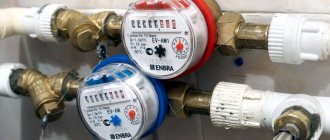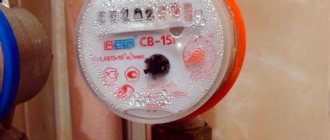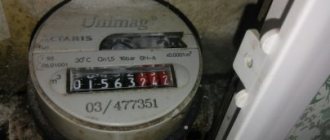What is the penalty amount for an unsealed water meter?
The amount of the fine is determined from the range established by regulatory documents (Administrative Code or Criminal Code), taking into account the degree of guilt of the owner.
In addition to the penalties imposed by the court, on the basis of clause 59 of government resolution No. 354 of 05/06/2011, establishing the rules for the provision of public services to the population, the consumer will have to pay an amount determined based on the average number of cubic meters according to the water meter for the period from notification supplier about damage to the meter protection.
If the fact of damage is established by the city water utility inspector, you will have to pay for the standard volume from the date of the last water meter inspection.
If it is confirmed that the device was damaged intentionally, the payment amount is calculated by determining the amount of water passing through a pipe of the diameter installed in the apartment, taking into account round-the-clock consumption.
Scheduled inspections by water utility employees are carried out no more than once every 6 months, so the amount accumulates is quite significant.
How will the fee be calculated?
Payment for used water will be calculated as follows:
- If the seal was lost due to corrosion, its accidental breakdown, and the subscriber informed about this fact. Clause 81(12) of the Rules equates an unsealed meter to a water meter failure. In this case, fees are calculated based on the average expense for a period of no more than 3 months (subparagraph “a” of paragraph 59 of the Rules). Further calculations will be carried out according to the standard.
- If the seal is damaged intentionally (torn off and the device is not sealed), then the charge will be made in accordance with the conditions of clause 62 of the Rules: the throughput of the water pipe, multiplied by the number of days of illegal operation of the water meter.
At what point does the calculation of deadlines begin?
The calculation of the period for payment of the fine begins from the date the court makes the relevant decision, formalized by the decree. Any administrative fine, including that imposed for breaking a seal, must be paid within 60 calendar days.
If the resource supplier assigns an amount as compensation for water consumption without appropriate meter control, these charges are added to the next utility bill.
According to the established rules, the invoice must be paid in the following month, before the 10th of the month.
The nuances of calculating a fine, what you should know
Did you break the seal? Call the controller!
Even if you are a law-abiding citizen who pays fines for violations and follows all the rules, you should still know your rights. Let's imagine the situation:
You were cleaning your apartment, during which you accidentally broke the seal on the water meter. As expected, the first thing you did was write an application to reconnect and seal the meter and wait for the controller to arrive. The controller comes, say, twelve calendar days later, draws up a report and gives it to you to sign.
So, you need to approach signing with all responsibility and read everything carefully, because a situation is possible when the act indicates not the date when you filled out the application, but the date of arrival of the controller, who, in turn, justifies his delay by the inability to contact you.
If you are sure that no one called you and are not going to overpay, then you have the right to challenge this situation; for this you should make a printout of your mobile and landline phone number. Perhaps someone saw the fact that the seal was damaged and can act as a witness (a neighbor, a visiting plumber, perhaps the damage occurred when replacing a pipeline, and so on).
If you do not agree with the decision made or the amount of the fine assessed, you have the legal opportunity to challenge it and prove that you are right.
Amounts of fines imposed for breaking the seal on a water meter:
- 200-300 rubles. Such a fine is considered standard for breaking a seal if the governing body has not detected illegal interference in the operation of the measuring device. This rule complies with Art. 19 clause 2 of the Code of Administrative Offenses of the Russian Federation.
- The standard amount is five times the amount. Such a fine must be paid by citizens in whose home a violation was detected in the form of connecting a magnet or connecting past the meter. This rule complies with Art. 7 clause 27 of the Code of Administrative Offenses of the Russian Federation.
- The amount reaches 300 thousand rubles or imprisonment for a period of 2 years. Such punishment may await unscrupulous residents who illegally connect to the water supply or use magnets. This rule complies with Art. 165 of the Criminal Code of the Russian Federation.
Amount of penalties for removing protection
The amount of the fine imposed depends on the circumstances surrounding the damage. The following penalties may be imposed:
standard - amounts from 100 to 300 rubles. for citizens or from 300 to 500 rubles. for organizations;- five-fold – assigned on the basis of clause 7.27 of the Code of Administrative Offences, if traces of resource theft are revealed (presence of a magnet, etc.);
- maximum - up to 300 thousand rubles or two years' imprisonment if the fact of theft using a magnet or other technical means is confirmed.
In addition to the fine, if the fact of unauthorized interference with the operation of the meter is revealed, the consumer will have to pay for water consumption for the period from the previous check of the water meter by water utility employees, taking into account current tariffs.
If a deliberately damaged seal is detected, this fact may be regarded as an unauthorized connection . In this case, the owner, in addition to the fine, compensates the supplier for the loss of resources.
What to do if the water meter seal is accidentally damaged
The seal can be broken due to negligence
Your actions:
- First: it is necessary to write a report about the fact of unauthorized removal of the seal;
- Second: submit an application for re-sealing of the meter;
- Third: wait for the controller to arrive.
The application must indicate the cause of this problem, and the inspector himself will determine the presence of illegal interference in the operation of the measuring device, if any.
If, when the inspector draws up the report, no violations of this type are found, and the meter readings correspond to reality, then the owner will not have to pay a fine. The only thing you will need to pay for is re-sealing.
How can a consumer find out about a penalty and who is authorized to decide on its imposition?
Employees of the organization supplying the resources have the right to determine the fact of damage to metering devices, including broken seals. Such structures include management companies or the water utility itself.
Inspections are carried out by inspectors authorized to perform these works by the management of these organizations.
The decision to impose a fine is made by the court based on the results of consideration of the claim filed by the resource provider. After the decision is adopted, the defendant officially familiarizes himself with the document.
Major changes
Let me briefly recall the essence of the new law. We are talking about Decree of the Government of the Russian Federation No. 554 of April 18, 2021, which came into force on July 1, 2021. A lot has been written about this law, and the main point was that now the replacement or purchase of a new meter must be carried out by resource supply organizations, and not by the owners, as was previously the case. Verification now also occurs at the expense of the resource supplier. These organizations have 6 months to install or verify the meter after the owner applies.
How responsibility has changed
Recently, legislation in the housing and communal services sector has undergone a number of changes. The changes especially affected the metering device. This is a very important topic, because the main amount in the receipt is charged for the consumption of resources, and this is water, electricity and heating. All these resources can be controlled thanks to meters, thereby eliminating overpayment, as was the case before, when some residents paid for others due to the equal distribution of payments among everyone. A simple example. There are 40 apartments in the building and 100 people are officially registered, but in fact 130 live, of which 30 are not registered. Water consumption in this case will be higher, but cubic meters were distributed only to 100 people who are officially registered. As a result, residents were forced to pay part of these costs for others. But let's move on to the essence of the issue. Let's consider a fairly common question that residents ask under the new law, what responsibility do they now bear, and in fact, the responsibility for metering devices has really changed.
You might be interested ==> Social protection of the Moscow region official website benefits for Chernobyl victims
— the approved consumption standard for cold water supply utilities (for apartment buildings or residential buildings with centralized cold and hot water supply with bathtubs 1500 - 1700 mm long) per person per month is 4.85 cubic meters. meter/person
Can it be avoided: extenuating circumstances
To avoid a fine, the consumer must adhere to the following recommendations:
regularly monitor the condition of the metering device;- prevent access to the meter by children, pets, the possibility of accidental damage during cleaning, etc.;
- if the seal is accidentally broken, you must immediately notify the management company about the incident by telephone, followed by a written application;
- after the arrival of an employee of the management company, draw up a report on the damage to the seal, indicating in the document the unintentional nature of the violation;
- obtain testimony from witnesses, take photographs or videos with footage confirming the circumstances of the seal failure and indicating the consumer’s innocence of the violation;
- do not leave a representative of the resource supplier in the room where the meter is located without supervision.
Often, water utility inspectors deliberately damage seals in order to then file claims against the consumer.
Therefore, during the inspection, it will not interfere with the presence of a disinterested witness who can confirm the absence of violations on the part of the consumer. When drawing up an act, before signing the document, the consumer must carefully read it. If the owner of the living space does not agree with the contents of the act, the document cannot be signed.
Who should install the meter?
Law No. 261, adopted in 2009, stipulated the obligation to install meters, but there was no mechanism for applying penalties for failure to comply. Therefore, no one imposed a fine for failure to install a meter. Only seven years later, adjustments were adopted, according to which sanctions began to be applied to citizens who did not install metering devices for purely subjective reasons.
Sanctions for failure to install
According to current legislation, all residential property owners must install a water meter. This norm has been in effect for several years, however, even now there are apartments and houses where there are no metering devices. The reasons are standard: poor awareness of citizens, high cost of equipment, or others. At the same time, installing a meter provides a significant reduction in utility costs. In its absence, the calculation is carried out according to the average standard water consumption per person. This standard exceeds the actual consumption several times, since it includes not only the actual consumption of the resource, but also possible leaks and illegal use. As a result, the total payment takes a significant hit on the budget, especially if several people live in the apartment.
At the same time, paragraph 84 of Rules No. 354 provides for the obligation of the utility service provider to carry out the inspection provided for in paragraph 82 of Rules No. 354 if the consumer (the owner of the premises or a person using the premises in an apartment building consuming utilities on another legal basis) fails to provide evidence to the contractor individual or general (apartment) metering device for 6 consecutive months no later than 15 days from the date of expiration of the specified 6-month period, another period established by the agreement containing provisions on the provision of utility services, and (or) decisions of the general meeting of premises owners in an apartment building.
How to dispute?
The procedure for challenging the penalty for breaking the water meter seal is a difficult and troublesome task. The homeowner has the right to file a counterclaim to protest the fine. The statement of claim is filed in accordance with the procedure established by law.
Documentary evidence of the consumer’s innocence is attached to the claim.
The innocence of the owner can be confirmed:
- testimony;
- photo or video materials;
- recordings of telephone conversations;
- results of water meter examination with the involvement of an expert organization.
If the court takes into account the evidence of the consumer’s innocence, it may be possible to make a decision to cancel the previously imposed fine.
How does the presence of a magnet affect?
If inspectors of a water utility or management company detect the presence of a magnet, this indicates signs of resource theft.
Such a charge is possible even if the magnet is not used, but is only in the possession of the consumer.
In this situation, it is possible to qualify the offense as petty theft, the punishment for which is determined by Art. 7.27 Code of Administrative Offences . In this case, the violator is given a fine in the amount of five times compensation for the losses caused.
In some situations Art. 165 of the Criminal Code of the Russian Federation, which provides for penalties in the amount of 300 thousand rubles or two years imprisonment.









